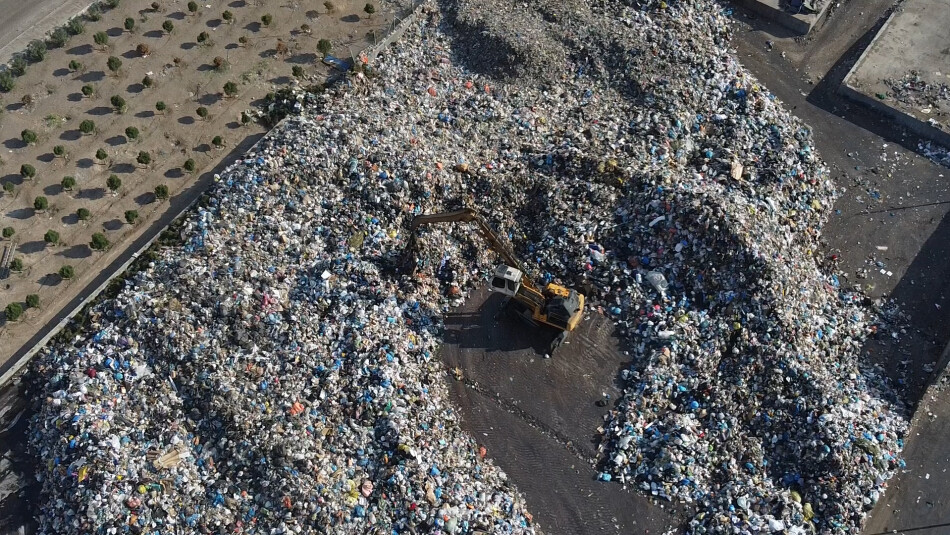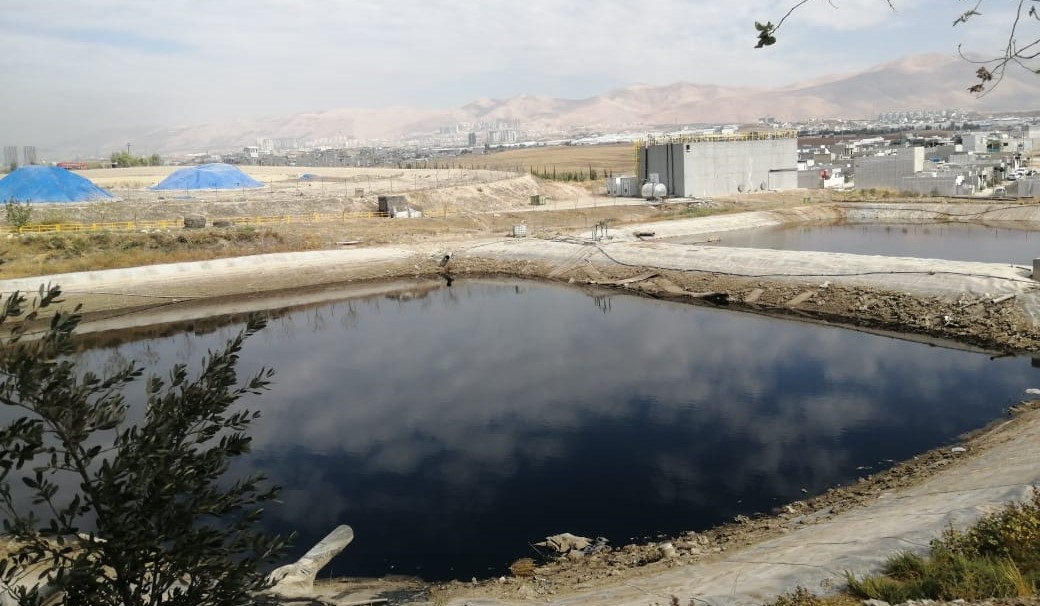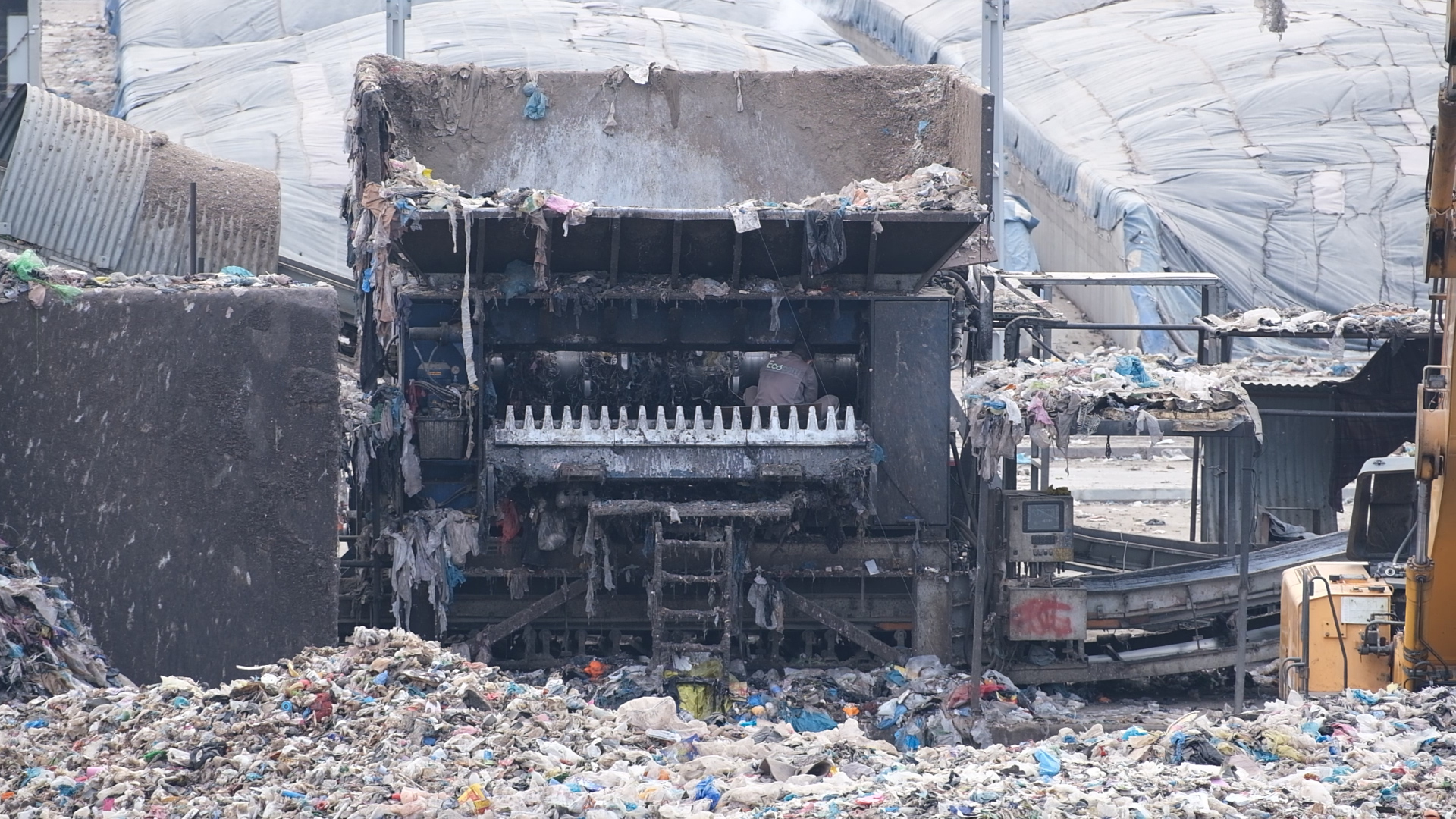
From the streets and neighborhoods of the city, all kinds of garbage are mixed with each other and collected in Tanjaro which used to be a place of burning, yet now it is going through several stages of treatment and turned into fuel and water, instead of becoming a disaster for the environment.
At the entrance to the factory, a lot of waste and debris has accumulated in a pool of mud, spreading an unpleasant smell, solid waste goes to a designated place to eventually produce fuel as alternative energy and not spill into tanker water.
Asia for Renewable Energy is the plant established in Tanjaro suburb of Sulaimaniyah, where all the garbage of the city is collected. It was opened in 2020 and built on an area of 250 hectares. It receives all the daily waste of Sulaymaniyah Northern Province, 1,000 tons a day, 35 to 40% of it is turns it into fuel and the rest is mud.
“The project treats household waste and solid waste; the solid waste is converted into alternative fuel and sent to cement factories, called Refuse Derived Fuel (RDF), as fuel instead of crude oil or kerosene, and does not pollute the environment” said Najmaddin Anwar, quality control manager at the Asia Renewable Energy Project.
The energy produced by the project is used for electricity generation in Gassin Cement Company and Lafarge Iraq Bazian Plants, and liquid waste, mostly garbage, is filtered and reused to water trees and greenery and clean the factory itself.
More than 1,300 tons of garbage used to be dumped daily in the Tanjaro area of Sulaimaniyah, in the south of the city, causing many harmful and toxic substances to mix with the rivers of the area, from where it affects groundwater. About 60% of total waste is food and 20% plastic, according to a study by Azadbun Organization for Sustainable Development.
The operation of our factory is only for the service of the environment and does not bring profits for the owner of the factory
They save the environment
“Our factory's work is only for the service of the environment and has no benefit for the owner of the factory,” said Anwar, adding that beside converting the solid waste into a kind of energy, the black liquid left of the solid waste is treated into yellowish water for irrigation of unproductive trees and firefighting.
The project for Waste Treatment in Sulaimaniyah was planned in 2013, but the security situation in Iraq and the war postponed it to 2019 and then stayed until April 2020.
Over 660 billion Iraqi dinars IQD (0,5 billion USD) have been spent on garbage collection and dumping in the five years of the ninth cabinet, according to the Kurdistan Regional Government’s KRG Ministry of Municipalities and Tourism.
Zardasht Rafiq, spokesman for the Sulaimaniyah Municipality, said 1,000 tons of garbage is sent daily to the factory, according to a contract between the project and the government.
“Sulaimaniyah waste used to be dumped in layers which was severely harmful for the environment and underground water,” Rafiq added.
Recycling solid waste and food is one of the ways to combat environmental pollution, according to United Nations UN statistics. Iraq is ranked the fifth region in the world to experience the negative impacts and consequences of climate change.
Dr. Salih Majid, a university professor and environmental expert, said he proposed the establishment of the Sulaimaniyah waste treatment project five years ago, “but according to the conditions and guidelines, because the dumping of waste and debris through layers, in addition to harm to the environment and groundwater, sometimes it would become a volcano and erupt which causes other damage and increase of carbon dioxide in the air.”
He said producing alternative energy instead of burning waste is much more beneficial to the environment, in addition to the water left over for irrigation.

Water Filteration
There are two empty gravity ponds in the Tanjaro project, which pipe all the water, mud and lead from the factory, from where they go to biological treatment and then filtering stages.
Initially, the employees were very afraid to touch the water, until one-day Dana Faraj, an employee of the same project, brought ornament fish to dispel the fear and used the filtered water in several small ponds for testing. Up today, almost 26,000 sube meter water has been treated.
“My experiment was successful. The fish are delicate and small, I left them there and they were constantly increasing. Thus, the others were no longer afraid of the water,” Faraj said.
Fuel and energy production in the world is one of the most negative challenges that accelerate the consequences of climate change, so the UN encourages alternative energy to protect the environment, not only that Instead, the air will be cleaner and public health will be protected.
Fuels such as coal, oil and gas are responsible for 75% of gas emissions, 90% of it are carbon dioxide.
Mohammed Mahmoud, an environmental expert and chemical engineer, describes the collection and management in per Tanjaro plant beneficial for the environment and groundwater.
“Otherwise, later the wastewater flows to Tanjaro or underground water, harms public health and agricultural products and the people living near the plant.
At the same time, he hoped that the sewage of the entire Sulaimaniyah would be collected and not poured into the tanker, but into a pond and go through the filtration stage, then go to the Tanjaro water for irrigation.
He also suggested the government "set up a factory for medical and solid waste such as iron and minerals, to be used for production of alternative materials and clean up the environment.”
The discharge of treated water is inspected and does not comply with the standards of the Environmental Board
According to Directive No. 4 of 2021 on Environmental Protection of Pollution and Waste Disposal; there is a penalty for mixing medical waste with ordinary waste and failing to comply with piling it in designated place, which is initially a warning and a fine of 150,000 to 10 million IQD and six-month prison, if continued, the penalty will go up to the license withdrawal and closure.
Mustafa Juma, spokesman for the Sulaimaniyah Environment, said, "The water left following waste treatment is called litter, the Environmental Board has special criteria for filtering and purifying it and reuse, which can then be mixed with water sources or sewage or irrigation of greenery. If so, it can be mixed directly with Tanjaro water.”
The factory's treated water is not yet per the standards of Environmental Board, so they have not given permission yet to mix with Tanjaro water.
“There are some stages of treatment to be implemented yet. We are visiting the plant and gave them time limit for treatment,” Juma added.
According to the KRG's Water Management and Protection Law No. 4 of 2022, water pollution for any reason, including waste and sewage, which harms humans, animals and the environment, is punishable by six months in prison and fines up to 10 million IQD.
Dr. Mohammed Abdulwahhab, head of the cancer control department in Sulaimaniyah, said, "Factory sewage, medical and household waste contain chemicals that flow to Tanjaro water which is used for agriculture. It contains high levels of heavy metals, eight types, and directly related to causing cancer.”
He praises setting up the waste treatment plant and the government should consider such a solution for all other places, such as hospitals and even public sewers.
According to the KRG Ministry of Health, 9,911 new cases of cancer were be registered in 2023.
The idea of the project was inspired by a similar project of a German company, but Sulaimaniyah factory has not been able to treat the odor and air of the plant, Anwar admitted.
“Though treated water passed the test yet it should be more colorless, odorless and tasteless,” he added.

Waste grinder in Asia Renewable Energy Factory, Sulaimaniya, 2024. Kochar Aziz
Over half of the world's sewage flows into rivers and other water resources, but only 11% is treated and reused, according to UN.
Water treatment systems vary according to the type of water. Household sewage is different from factory sewage and hospital sewage is different from other countries, says Sarkhel Hawry, PhD candidate of Water Resources Management.
"In the Kurdistan Region, for example, Sulaimaniyah, nothing is separated, everything is mixed together and thrown into Tanjaro water, which is very harmful to the people of and the agriculture of the area," he said.
Neighbor unsatisfied
The factory has been operating for four years, but the government has not paid any dues and has issues cheques for accounts with no credit, according to the quality director of the Asia Renewable Energy Project.
There are other obstacles, there have been several protests against the project, including against the dust and the smell of waste and garbage. Anwar did not deny that up to the present they could not solve the smell issue. “It costs a lot while the government does not give a hand.
“For the dust, we have installed two machines and decreased somewhat".
The factory is located in Tanjaro, less than 10 kilometers from the center of Sulaimaniyah.
Aso Ali, a resident of Zhalay Jaza Jafa village, less than 200 meters from the factory, said, “The smell has caused a lot of problems. The government should have licensed the factory in this place close to residence of people.
The problem is worse in summer as the dust gets worse. They have reported it to the relevant government authorities more than once.
“It is true that this factory was built to beautify and clean the city, but it has harmed us,” Ali added, calling for a permanent solution to the factory's waste problem.
In the same area, there are villages of Zhalay Sarw, Bardakar, Hwana, Zhalay Khawarw and Samwat, home to 10,000 households.
The center of the Kurdistan Region's cities has become a place of waste, chemicals and cement, and gases emitted from factories and vehicles
Kamran Karadaghi, a specialist in chest and respiratory diseases, says the center of the Kurdistan Region cities has become a place of waste, chemicals and cement, the gases emitted from factories and vehicles, the causes of infection and increased respiratory diseases and allergies.
He confirmed that asthma, allergies and respiratory diseases, which had previously increased from 7 to 15%, spiked to 27%, in addition to a significant increase in diseases of the throat, nose, ears and eyes.
According to the Law No. 8 of 2008 on Environmental Protection and Improvement, pollution of the environment and climate in Kurdistan is punishable by imprisonment and a fine of up to 200 million IQD, depending on the type of violation.
Adnan Karim, from Zhalay Jaza Jaf village, angrily said, “All the diseases and sufferings are caused by this mill,” referring to the factory.
The factory dust, if not treated, is harmful to the environment and causes air pollution.
"There is damage to the houses around the factory, so this problem must be taken into account, and the litter must be completely treated," Majid affirmed.
Another challenge facing the factory is the mixing of all kinds of waste, because it is inseparable. In households and public places, food, glass, metal and plastic are put together in dustbin.
The quality director of the project says the initiative is only in Sulaimaniyah, they have been asked to take the same project to Kirkuk, Najaf and Baghdad, "but we did not agree because they were asking for a share for themselves," without going into further details.
*This story has been produced as part of the program to expand the role of women journalists in environmental coverage, implemented by KirkukNow Media Outlet and financially supported by the Ministry of Foreign Affairs of the Federal Republic of Germany.